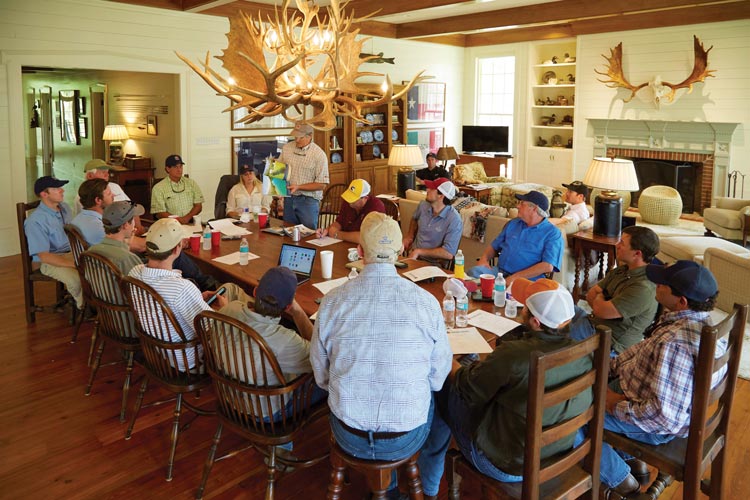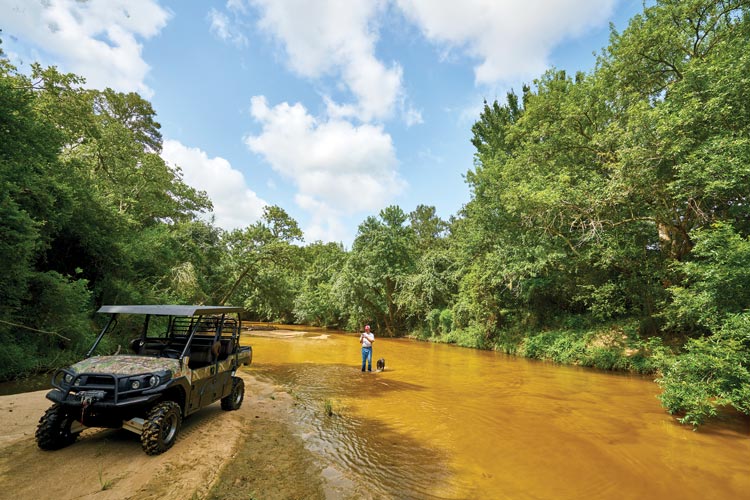Written by Lorie Woodward
“Mark [Matthews] and I ended up at the Dairy Queen in Carrizo Springs at the same time one afternoon,” said Jeff Boswell, a founding partner at Republic who lives in Houston.
The duo, who were each working for different ranch real estate companies, had been introduced but never had the opportunity for an in-depth discussion.
“That afternoon—over a Blizzard™—we found out we had similar ideas about the direction the ranch real estate industry was headed and how a ranch real estate brokerage should work to accommodate the industry’s changing landscape,” Boswell said.
Although they brought different perspectives to the table, the future partners agreed ranch real estate was poised to become a specialized field of real estate akin to commercial or residential. In addition, changing buyer demographics, rising demand for recreational real estate, and emerging technology, warranted a more professional, large-scale approach to the industry.
“The days of ranchers buying the neighboring properties or brokers hauling someone around in a pickup truck using ads from the weekly newspaper were waning,” Boswell said. “We wanted to create a new company and invest a significant amount to become a marketing powerhouse with the ability to sell rural land the way it should be sold.”
They envisioned a company that covered the state with a network of associates who not only knew the market and the players in their particular eco-region, but had extensive statewide networks and also had expertise in land-related areas such as wildlife management, geology, real estate law, range management, fisheries, hydrology, outfitting, equestrian pursuits and more.
“One of the industry’s weaknesses, as we saw it at the time, was a lack of collaboration between brokers.”
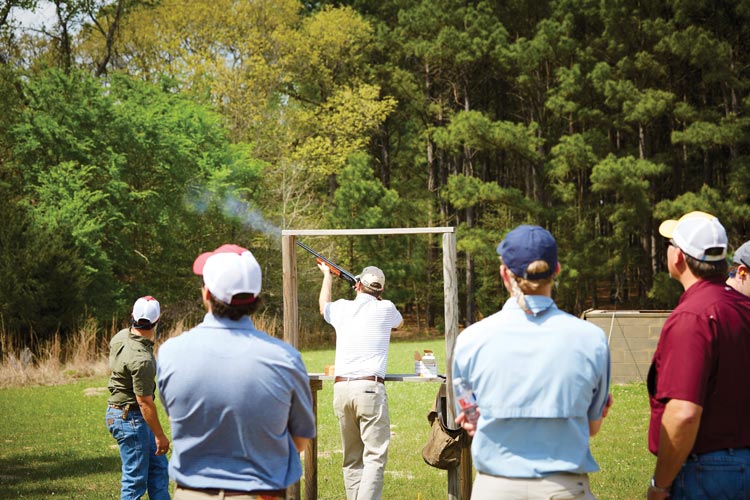
“Each eco-region in Texas has its own personality and its own productive strengths and weaknesses,” Mark Matthews, who lives in Medina, said. “Increasingly land buyers were interested in recreational ranches, but many of them didn’t know the ‘bones’ of what makes a ranch viable. To help buyers achieve their goals, we wanted people on our team who knew the land—and then some.”
Boswell and Matthews also recognized the power of collaboration.
“One of the industry’s weaknesses, as we saw it at the time, was a lack of collaboration between brokers,” Matthews said. “Keeping the business to yourself in hopes of a larger piece of the commission, doesn’t give your clients—whether they are selling or buying—the broadest opportunities, so we wanted a commission structure that encourages collaboration with outside brokers as well as within our team.”
The future partners eventually ran out of time and ice cream, but not ideas. Soon after they met again for two intensive days on a ranch along the Nueces River. They emerged from the pow-wow with a clear understanding of their shared goals, a surprising number of common connections and a business plan.
“Our goal was to form a business that could rapidly grow into a major presence,” Boswell said.
The Next Steps
Rapid growth requires a strong foundation, so the duo quickly identified two additional partners to serve as cornerstones: Bryan Pickens from Dallas and Charles Davidson from San Antonio.
“Texas is a big state and to create an effective network, we wanted strong leaders in certain geographic areas who would be the best representatives of our company regionally and statewide,” Boswell said.
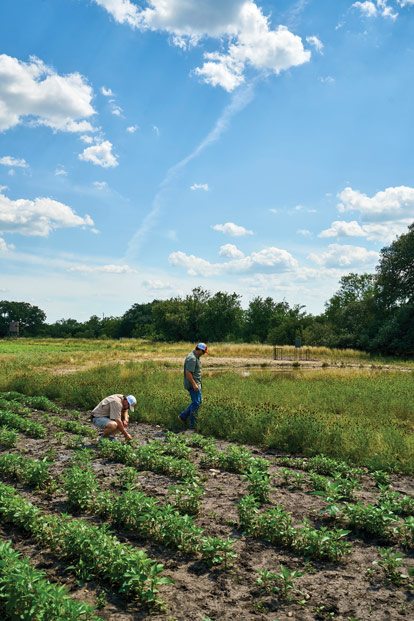
“Although we got a little pushback initially, we opened our first offices in Houston, San Antonio, and Dallas with Austin and Corpus following close behind,” Matthews said. “It makes sense to have ranch professionals where the buyers are.”
Boswell continued, “Our metro locations really help the sellers too. We know the people in the cities who are looking for land—and we know how to get in front of them.”
The next step was building the extended team. Staying true to their vision, the partners began actively seeking out and recruiting new talent who had insider knowledge of particular eco-regions, land-related expertise and broad networks that stretched across the state.
“In addition to knowing a region and having a skill set that could diversify our expertise, we wanted people who were also connected with the ‘right’ groups whose interests potentially lent themselves to land purchases,” Boswell said. “Our team members amplified the reach of our network.”
The formula worked. In the past six years, the business has grown from 4 people to 34.
And Texas, despite its size, isn’t big enough to contain the growth. Republic, which has been operating in Oklahoma since 2012, will soon open an office in Pagosa Springs, Colo., to serve clients in Colorado and New Mexico.
“There are an astounding number of Texans who already own ranches in these states,” Boswell said. “Many of our clients own land there—or want to own land there—so establishing a presence is a logical, natural progression for our business.”
While the upcoming expansion marks the first time the company has established an office outside of the Lone Star State, it is not the first time the group has worked across state lines. Early on, Republic Ranches formed a marketing alliance with Fay Ranches, a Montana-based brokerage that is a force throughout the Rocky Mountain West.
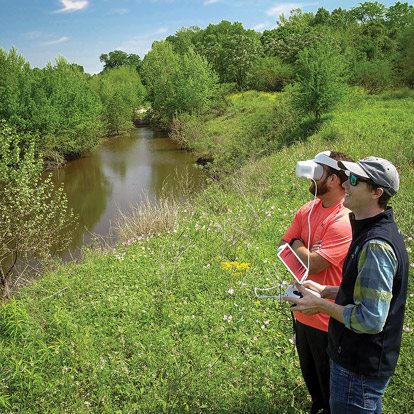
The marketing partnership is just one example of the intentional collaboration that Matthews credits for Republic’s rapid, sustained growth.
“Whether it’s with another brokerage or in-house, our commitment to a structure that inspires collaboration to deliver the best results for our clients is our secret ingredient,” Matthews said. “Of course, it’s not a well-kept secret because people know we believe in working together.”
Guiding Principle
From the outset, the Republic Ranches team vowed to putting the clients’ needs above every other consideration.
“As cliché as it might sound, the clients’ needs come first,” Boswell said. “We live it and breathe it—every day and in every situation.”
In order to deliver on that promise, the team begins with the potential landowner’s goals in mind.
“I won’t even start showing clients properties until I understand exactly what they hope to accomplish on the land,” Matthews said.
For instance, if clients want to grow big deer, raise wild bobwhites or hunt pronghorns, there are certain parts of the state that lend themselves to those goals—and then there are locations within those eco-regions that are more productive and better suited than others, Matthews said.
Helping clients find the properties that will help them achieve their goals is where the benefits of having an extended expert team come into play.
“I won’t even start showing clients properties until I understand exactly what they hope to accomplish on the land.”
“It’s easy to learn the vocabulary of ranch real estate and habitat management,” Matthews said. “It’s not easy to assess a piece of land and determine whether or not it has the capacity—because of habitat, water tables and a host of other factors—to translate those ‘easy words’ into results.”
The deep bench of talent allows Republic’s leadership to mix-and-match experts to create a customized team for each transaction.
“It boils down to having the expertise to meet the client’s needs, whatever those might be,” Matthews said. “You have to have the knowledge to gain the trust of clients who are either in the midst of making one of the largest investments in their lives or selling something that has been a valued part of their family.”
Being knowledgeable, forthright and honest in order to meet the clients’ needs is more important to the Republic team than closing an “easy” deal.
“Each piece of property presents opportunities and issues, and it takes a level of professionalism to resist the ‘easy kill’ sale,” Boswell said. “You can’t sell someone something and just hope that they don’t discover the property has inadequate groundwater, endangered species habitat that presents an issue to a buyer’s objectives or is a former dump site. Our clients can trust that they will be making their decisions based on all of the information we can gather.”
The same holds true for sellers.
“During listing pitches, we base our prices on data not wishes,” Matthews said. “We’d rather lose the listing than gain clients using a fictitious price that makes them happy in the short-term but isn’t deliverable in the market.”
The ability to leverage expertise beyond the transaction is a hallmark of Republic’s service. Post-closing assistance is particularly useful now that many new ranch owners have limited experience on the land. In fact, Boswell estimates, he spends up to 30 percent of his time on post-closing service.
Encounters range from answering a question, mobilizing a team member with specific expertise to help with an issue or using the team’s expertise to manage 1-D-1 valuation. In Matthews’ case, he also has a full-service hunting and construction business, so he has additional capacity to tackle long-term land improvement projects.
Regardless of the type of effort brought to bear on behalf of a client, it is worthwhile.
“Our goal is to keep clients for life—and the best way to do that is to be knowledgeable, be available and be helpful,” Boswell said. “When we put our clients’ needs first in every arena, our business is a success.”
